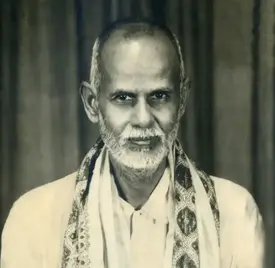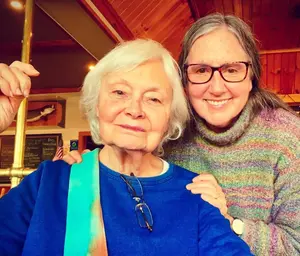Are We Happy ?
There is no one who does not desire happiness. We all strive for it, in various ways, and we think that by obtaining things external to ourselves that we will obtain the elusive gem of happiness. However, Sri Bhagavan tells us that this is not so. In order to gain the true, unfailing beatitude, he says, we need to know our true swarupa, which is indeed unshakeable happiness and peace. Sri Lakshmana Sarma (WHO) explores the nature of happiness in Chapter two of his book Maha Yoga, and asks, “Are we happy?” He then explores the barriers to its attainment, such as desire and fear. If we seriously resolve to overcome these barriers, Sri Sarma emphasises the need to seek out and take refuge in the jnani who has himself transcended these limitations and who can show us the method as well as give us the required support to complete the task. The Sage of Arunachala, Sri Bhagavan, shed his grace on Lakshmana Sarma, guiding him as a parent does their child and granted him, it is evident, abhayam, fearlessness. Let us all benefit from his divine counsel.
This world is to us a means to an end, namely happiness; at least it is so for most of us. Some there are who maintain that we are here for the sake of the world, not for our own sake. What they mean is that we ought not to live for ourselves, but for the world. But that is quite another matter. The fact is that we live for ourselves in the first place, and for the world also in so far as the good of the world happens to be also our own. That being the case, we shall have to consider, some time or other, whether we have found happiness, and if not, then why not; we shall have to think over the question whether, in seeking happiness in and through this world, we have not made some false assumptions.
We begin life with the belief that happiness can be had in and through this world. And most people go on believing thus to the very end. They never pause and think; they do not take notice of the fact that their hopes of happiness have not been realised. How then can they consider the further question, why those hopes have been falsified?
All the religions and philosophies of the world cannot do for us what we can do for ourselves, if we pause and think, for what we get from these is just so much mind-lumber — mere fashions of thought and speech which do not fit in with what we really are; for only what we find out for ourselves from our own experience can be of real use to us. Further, we can find nothing of real value, even from our own experience, if we do not pause and think. If these religions and philosophies just hasten the day when we shall pause and think, they shall have done quite enough for us.
What keeps us from pausing and thinking is the belief that we are getting – or shall soon get – from life the thing we want, happiness. The one thing that can possibly shake this belief is experience of the tragic side of life. We are told by the Sage of Arunachala that this is Nature’s way; and he gives us the analogy of dreams to prove it; when we are dreaming of pleasant things we do not awake: but we do so as soon as we see visions of a frightful nature. A life of placid enjoyment is naturally inimical to serious thinking on serious subjects; and here the religious-minded are no better than the rest of us.
Let us suppose that we have found life disappointing, if not quite intolerable – that we have found it so either on our own account, or as representatives of the whole race of men. We must suppose so, since these inquiries are only for those that have so found it. In fact, many of us have found it so, and that not once, but again and again.
What have we done each time? We have consulted priests or astrologers, or prayed to God; these are the popular patent remedies for the disease that afflicts us all. And these have only postponed the crisis. And this will be so till we pause and think.
We sought happiness through all the weary years; again and again we were on the point of winning it and making it ours forever; but each time we were deceived; but without pausing to think – as we shall now do – we simply went on in the same old way. If now we pause and think, – the thought will occur to us, that probably we set out on the quest of happiness without a right understanding of the true nature and source of it.
First, let us look at happiness itself and find out what it is. What we mean by happiness is something constant, something that will abide with us in all its freshness and purity so long as we ourselves exist. What the world has given us is not that, but something transient and variable, and its rightful name is pleasure. Happiness and pleasure are two entirely different things. But we assume that pleasures are the very texture of happiness; we assume that if we can provide for a constant stream of pleasures for all time we shall secure happiness.
But it is the very nature of pleasure to be inconstant; for pleasure is just our reaction to the impact of outside things. Certain things give us pleasure, and we seek to acquire and keep hold of them; but the same objects do not give equal pleasure at all times; sometimes they even give pain. Thus, we are often cheated of the pleasure we bargained for, and find that we are in for pain at times; pleasure and pain are in fact inseparable companions.
The sage of Arunachala tells us that even pleasure is not from things. If the pleasure that we taste in life were really from things, then it must be more when one has more things, less when one has less, and none when one has none; but that is not the case. The rich, who have an abundance of things, are not exactly happy; nor are the poor, who have very little, exactly unhappy. And all alike, if and when they get sound, dreamless sleep, are supremely happy. To make sure of the undisturbed enjoyment of sleep we provide ourselves with every available artificial aid – soft beds and pillows, mosquito curtains, warm blankets or cool breezes, and so on. The loss of sleep is accounted a grievous evil; for its sake, men are willing to poison the very source of life, the brain, with deadly drugs. All this shows how much we love sleep; and we love it, because in it we are happy.
We are thus justified in suspecting that true happiness is – as many wise men have told us – something belonging to our own inner nature. Sages have ever taught that pleasure has no independent existence; it does not reside in external objects at all; it appears to do so because of a mere coincidence; pleasure is due to a release of our own natural happiness, imprisoned in the inner depths of our being; this release occurs just when, after a rather painful quest, a desired object is won, or when a hated one is removed. As a hungry street-dog munching a bare bone, and tasting its own blood, might think the taste is in the bone, so do we assume that the pleasures we enjoy are in the things that we seek and get hold of. It may be said that desire is the cause of our being exiled from the happiness that is within us, and its momentary cessation just allows us to taste a little of that happiness for the time being.
Because we are most of the time desiring to get hold of something, or to get rid of something, we are most of the time unhappy. The desire to get rid of something is due to fear. So, desire and fear are the two enemies of happiness. And so long as we are content to remain subject to them, we shall never be really happy. To be subject to desire or fear is itself unhappiness; and the more intense the desire or the fear, the keener is the unhappiness.
Desire tells us, each time, ‘Now get thou this, and then you shall be happy.’ We believe it implicitly and set about getting it. We are unhappy for wanting it, but we forget the unhappiness in the effort. If we do not get it, we have to suffer. Neither are we happy if we get it; for desire then finds something else for us to strive for, and we fail to see how desire is fooling us all the time. The fact is, desire is like a bottomless pit which one can never fill up, or like the all consuming fire which burns the fiercer, the more we feed it.
As desire is without end, so is fear; for the things that fear tells us to avoid are without end.
Thus, we come to this conclusion; so long as desire and fear have sway over us, we shall never reach happiness. If we be content to remain in bondage to them, we must, as rational beings, renounce all hope of happiness.
But knowing that desire and fear are our enemies, can we not put them away by sheer willpower? The answer that experience gives is ‘No’. We may, like the Stoics, wrestle with them and succeed in overcoming them for a time. But the victory does not last, and finally, we give up the fight. Without help from someone else, we feel, we cannot hope to achieve lasting deliverance. And who can help us, but one that has himself conquered desire and fear, and won for himself perfect happiness?
Such a one we must seek and find if we are sincerely and earnestly resolved to become free from these our foes – the foes of happiness. He alone can show us the path, and also give the power to tread the path; for he knows both the goal and the path. The ancient lore tells us – and we can now see that it does so rightly – that one that is in earnest for freedom must seek and reverently question one that is himself free. He who feels acutely the need for a remedy for the ills that are inseparable from life cannot help seeking someone who is competent to guide him aright; he can no more help it, than a sick man can help going in search of a healer.
There have been men in the past, who had won true happiness for themselves and were thus able to help others also; what they taught their own disciples is recorded, more or less faithfully, in the scriptures of the religions they are supposed to have founded. But the records as we now find them are incomplete, and more or less distorted by the want of clarity of those that wrote them down; the teachings were given orally; they were not written down till long after the Teachers had passed away. They cannot have for us the same value as the words heard from a living Teacher; and this not only because we can be sure that the teaching is genuine, but also, or chiefly, because the living Teacher is a centre of spiritual power, which we lack. Such a Teacher is the Sage of Arunachala.
Verses from Guru Vachaka Kovai
1187. The feet of Siva reside in the Heart as the Atma-swarupa; transendental speech (paravak) is the elegant and felicitous word that remains without rising up out of the Heart; ever firm mouna is a worshipping-without-worshipping; that is ceaselessly-flowing prayer to the feet of Siva through that transcendental speech. This (ever-firm mauna) alone is the natural and true worship that takes place in the Heart.
1188. Only those who have realised their beingness in Sivam have drowned themselves in mauna, the state of perfect well-being. Abandoning the feeling of ‘I’ in things that are alien to Sivam, abide in Sivam without any activity (of your own).
1189. By turning towards the Self, a person should dive within and enquire, ‘Who is the bogus independent entity who says “I”? Through that enquiry he should die willingly in the Atma-swarupa, which is devoid of the ego, and which is the true form of God. The excellence of the state of mauna that then shines, and with which it is indistinguishably merged, is the consummation of the practice of surrender.
Notes from the North Mountain
As the wintery weather gathers, highlighted by plunging temperatures, gusting winds and accumulating snow and ice that surround the Ashrama, I am reminded of a song that is often sung during the Christmas season, 'Good King Wenceslas'. Described therein is the same cold and blustery winter weather, and a King and his page who braved the storm to help a poor man that they had observed gathering wood to keep himself warm. Feeling the bitter cold as they set out, the page declared, as he followed his King:
Sire, the night is darker now And the wind blows stronger Fails my heart, I know not how I can go no longer.
The King replies and encourages the page to follow in his footsteps, so that the cold be less biting, and the ordeal less taxing:
Mark my footsteps, good my page Tread thou in them boldly Thou shall find the winter's rage Freeze thy blood less coldly.
And as the page followed the brave King's footsteps, a miracle occurred!
In his masters step he trod Where the snow lay dinted Heat was in the very sod Which the Saint had printed!
When we walk into Sri Ramanasramam and Arunachala, we are blessed, as we are walking on the same soil as Sri Bhagavan himself walked upon. He declared that there is not an inch of Arunachala where he had not set his foot. With every step that we take in Sri Ramanasramam and Arunachala, we feel we are on holy soil which has been sanctified by his divine feet.
Here at Arunachala Ashrama also, we can get an intimation of the land having been sanctified by the tread of true devotees, those who have completely surrendered themselves at the feet of Sri Bhagavan. From the founder of Arunachala Ashrama, Sri Arunachala Bhakta Bhagawata, to our friend Dennis Hartel, to the sadhus, seekers and other friends who have graced the Ashrama, all have, by the dint of their devotion and dedication left their imprint on this sacred place. And when we walk here, we too feel the immensity of their devotion, and our heart feels warmed and insulated against the cold north winds that come to all seekers at times, in the form of worldly trials and tribulations.
Therefore, Christian men be sure, Wealth or rank possessing, Ye who now will bless the poor Shall yourselves find blessing.
In the Christmas carol, walking in the footprints of the King, the page found solace. We too, by thinking of Sri Bhagavan's devotees and of the immense love they had for their guru and refuge, and by attempting (however imperfectly) to follow their footsteps leading to the Holy Hill, will find the path has been made much easier. The groundwork has been laid by their sadhana. Our need to trudge through the unbroken snow has been removed by their footprints. We can simply follow the path they have shown, and, thanks to their untiring efforts, reach our goal. These devotees, purified in the fire of their love for Sri Bhagavan, have in a way blessed us poor ones who are also searching for true happiness and peace, and there is no doubt that they have indeed obtained the greatest blessing. They show us the direct path to the Sage of Arunachala.
Margo Martin
October 27, 1938 - January 17, 2024
Margo Martin, best known among friends for her association with Arunachala Ashrama of over 50 years, died peacefully in the early morning hours of January 17, 2024.
From the age of 35 when Margo first came to Arunachala Ashrama on East 6th St. in Manhattan, New York City, she lived a life guided by her goal to realize the Self. Margo was among those befriended by Sri Arunachala Bhakta Bhagawata in the 1970s. Sri Bhagawata highly valued the importance of dedication to spiritual practice coupled with open-hearted, non-judgmental friendliness to all.
Margo was known for her love of animals and for her love of plants, especially succulents and flowers. She maintained a beautiful collection of succulents, which delighted Ashrama visitors.
She was gifted in many ways – art, acting, language, and she was blessed with beauty, intelligence, and insight, coupled with a sharp wit. She edited the reminiscences of Arunachala Bhakta Bhagawata published under the title In Search of Self, and also was a behind-the-scenes proofreader of The Maharshi' newsletter.
Margo had a varied, colorful early adulthood. Following her graduation from South Oak Cliff High School in Texas, Margo worked as a dancer at the Sand’s Hotel in Las Vegas. She then moved to New York City where she studied art at The Cooper Union. She studied acting, was an avid student of film and also worked as a model and fashion designer. In addition, her later jobs involved promotional writing for scientific publications and teaching graphic arts at Pace College as an adjunct professor. She was an eminently well-read autodidact. On coming to Arunachala Ashrama, all these pursuits, however, took second place to her life goal of Self-knowledge.
As her practice of Sri Bhagavan’s teachings deepened, Margo’s compassion and wisdom grew and blossomed. She dedicated herself to Sri Bhagavan fully and was absorbed in his feet during the early morning hours of January 17.
She leaves behind a large group of friends and fellow devotees who have cherished her friendship over the decades. Margo is survived by her loving daughter Annie Troutman, her niece Jennifer Martin Spera and her nephew Joel Martin.
A memorial service was held for Margo on Jan. 21 in Arunachala Ashrama, New York. The devotees chanted Sri Lalita Sahasranamam and Hanuman Chalisa, and shared recollections of Margo's dedication and devotion. Several devotees were instrumental in providing care to Margo during her last days, thereby enabling her to stay in the Ashrama and at the feet of Sri Bhagavan, her refuge for over five decades.
A moksha deepam was lit at Sri Ramanasramam to commemorate Margo's passing.
Great Grace: A Tribute to Margo Martin
Margo was not a sweetness and light cookie cutter devotee. Then, why do we so miss her? To me, the story of Margo in all details is the story of Sri Bhagavan’s great grace.
Margo grew up in a small Texas town called Venus where she described a girlhood on a lake and rowboat rides to go to school or town.
As a young woman, Margo came to NYC where she studied art and acting. She developed a great interest in film. However, by the age of 35 Margo was ripe and ready to give up worldly pursuits for life’s highest goal.
Margo first walked into Arunachala Ashrama in September of 1973 and never left. She was among the first group of young adults inspired by Arunachala Bhakta Bhagawata to take up the mission of Self-inquiry and self surrender in all earnestness.
I would like to mention some of the things I find myself missing about Margo…
Margo’s voice – so beautiful – warm, deep and musical.
Margo’s astute insight into people and their motivations.
Wide-ranging, open-hearted conversations about anything and everything.
Margo’s sharp wit (as long as it wasn’t directed at me!)
I have often thought that living in an ashram would be a bit like being in a fishbowl, so it was in Margo's case. Everyone knows the things that Margo loved: movies, spirulina and frozen yogurt, flowers – and succulents in particular.
Margo's love of succulents was a form of meditation in which she expressed her love of an aesthetic ideal of spare beauty among small things. I have often thought that in the world of plants succulents are the devotees – low maintenance and slow-growing, they blossom whether they are noticed or not, endowed with timeless beauty. Hence, an ideal subject of meditation, for one who aspires to simplicity. And, of course, Margo loved her daughter Annie – Margo’s own heart.
Margo was just always HERE. “When are you coming?” she would ask with genuine happiness to see devotees.
And, an admonition from Margo carried weight – the weight of her insight that would hit the mark.
I would like to close with a fond remembrance of Margo sent by Eric Ford who wrote: “Margo had such warmth and humor. She was such a kind and gentle friend. And of course, she struggled with some real challenges too but she kept a steady and resilient faith and determination in the face of it. In this way I found her to be an inspiration. I will miss her friendly presence, and at the same time feel a deep happiness for her rest and repose in the Self.”
The beauty of the story of how Sri Bhagavan took Margo up in his arms – flaws and all – to lead her to life’s goal is that this is our story too… a story of Sri Bhagavan’s immeasurable compassion, power and grace.
The Undying Self
News of someone's death was brought to Sri Bhagavan. He said, "Good. The dead are indeed happy. They have got rid of the troublesome overgrowth - the body. The dead man does not grieve.
The survivors grieve for the man who is dead. Do men fear sleep? On the contrary sleep is courted and on waking up every man says that he slept happily. One prepares the bed for sound sleep. Sleep is temporary death. Death is longer sleep. If the man dies while yet alive he need not grieve over others' death. One's existence is evident with or without the body, as in waking, dream and sleep. Then why should one desire continuance of the bodily shackles? Let the man find out his undying Self and die and be immortal and happy."
— Talks with Sri Ramana Maharshi, Talk #64.Mrs. Raj K. Sharma
Feb. 18, 1933 – Dec. 29, 2023
Mrs. Raj K. Sharma was absorbed at the feet of Bhagavan in the Palliative Care unit of the Victoria General Hospital in Halifax, Nova Scotia on Dec. 29, 2023. She was a loving wife to Janak for 67 years, and the mother of Anil (Vijaya), Atul (Celia) and Arun (Aileen). Coming from India to Canada with young children in tow to join her husband in 1961, Raj settled into life in a new world with strength and determination. These are traits that she displayed throughout all aspects of her life. Even during her last days, with her severe health concerns, she would reassure all her friends and family that she was feeling fine, and that there was no reason for concern. She nurtured her family with her delicious cooking made with one special ingredient. One of her close friends shared that ingredient, saying “Mrs.Sharma cooks with LOVE.” Indeed, many friends agreed. She made Nova Scotia her home for 47 years, and returning here after living in Ottawa for some years, happily settled back into the arms of the “sea-bound coast.” Despite her advancing age, she still could easily outmanoeuvre us all in a good-will exchange of barbs, and continued to share her laugh and optimism with friends and family. As her health declined, she reassured us by saying, “You know, I am slowing down. I am getting ready to go. Bhagavan is going with me and going to keep me with him. He has been very kind. Please say prayers for my mukti.” As the time for her transition to freer living approached, she was heard to repeat, “It had been good. I have been fortunate, and I am thankful.” Her last days in the hospital were spent with her family by her side singing the praises of Sri Bhagavan and the repetition of Ram Nam. She passed away with the name of Sri Bhagavan resounding in her ears.




![Heat was in the very sod... [2024-0130-110515]](/images/sm/footsteps.webp)




